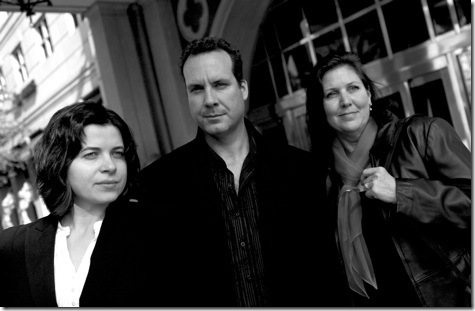Introducing the chamber music group Pulse in its Palm Beach County debut, Alan Bowman, director of the Music at St. Patrick’s series at St. Patrick Catholic Church in Palm Beach Gardens, described this pianist, violinist and clarinetist as a virtuoso trio – and indeed they are.
Pianist Maria Radiushina won the Horowitz International competition in Kiev, clarinetist Margaret Donaghue Flavin holds three music degrees from three universities, and violinist Scott Flavin is concertmaster of Florida Grand Opera’s fine orchestra in Miami, where the group resides.
Pulse opened its program with Aram Khachaturian’s Trio, written in 1932 while the Armenian composer was studying at the Moscow Conservatory. The clarinet leads off in a mystical and plaintive manner with embellished notes accompanying from the violin. Now the piano emphasizes the tune, ending almost as quickly as it began.
The second movement is dominated by the clarinet suggesting folk songs from the steppes and farms of Central Russia. The last has some lovely melodies for the clarinet but the mood is continually somber. One has to wonder if the composer wrote this as a dirge, or homage for the millions of farmers who refused to “collectivize” under dictator Josef Stalin. Along with Prokofiev and Shostakovich, Khachaturian was often out of favor in the USSR.
Turkish composer, Erberk Eryilmaz’s Three Miniatures followed. Full of clashing harmonies, each piece was quite moving in its own way. Drawn from 150 pieces submitted on the Web, it had charm enough. On the Road, the last movement, aptly named, suggested a jolly motor car ride over rough terrain.
Paquito D’Rivera’s Vals Venezolano and Contradanza, which followed, had great appeal. The jazz composer, a saxophonist and clarinetist himself, wrote this very short piece for clarinet and Donaghue Flavin gave it a fine reading. It’s in waltz time and is very attractive.With its closing jazzy overtones one is reminded of Scott Joplin’s piano ragtime tunes.
So, after musical visits to Russia, Turkey and Venezuela, one arrived at China with Xiao Hu’s Native Style. This time, Scott Flavin played the viola. Describing the music as centered on just two strings, Chinese-style, it starts slowly, with two notes, building to a dance rhythm. The clarinet joins in on two notes and then the piano. This theme develops, interrupted by low chords on the clarinet and the piano. The viola returns to its two notes and all three players quietly continue mystically, double pianissimo, conjuring the China of a distant dynasty. Rushing modern music suddenly floods in with a sharp shrillness, bringing the piece to a close with clashing harmonic dissonances.
Two arrangements by Scott Flavin came next, beginning with a motet by the Slovenian Renaissance composer Jacob Handl (1550-1591), Ab Oriente venerunt magi, about the visit of the three Wise Men to the Christ Child. It sounded beautiful in St. Patrick’s lively acoustic space; plainsong harmonies on the piano and moving violin melodies together made this arrangement quite fetching. A short Cavatina by Fritz Kreisler, showed Flavin’s virtuoso side, with fast fingering and smooth bowing. A difficult lively piece, and it met with rapturous applause from the 150-plus on hand for the concert.
Saving the best until last, Pulse closed its concert with Mozart’s Kegelstatt Trio (in E-flat, K. 498). The clarinet was newly invented when this was written and it’s thought Mozart was the first to write a trio including it.
From the start one realizes Mozart had complete grasp of the clarinet’s capabilities: it blends in well with the others in the first movement. A bold clarinet statement opens the second and the music flows along majestically. Sprightly tunes are passed around, and there was some beautiful deft piano playing by Radiushina here.
Terrific runs and scales on the piano and the clarinet dominate the last movement, and a lofty rallentando from the violin hints the end is in sight after many repeats. The Trio lilts to its end and one realizes Mozart has had great fun writing this, the very first composition of its kind.
But whatever possessed them to end the concert with a parody of the Mozart by Mark Lanz Weiser called Kegelstatt Funk? It was mediocre and inferior to the Mozart that came before. It showed that the trio is “with it,” but it broke the mood left by the Mozart and showed questionable taste. The musicians of Pulse are consummate artists and don’t need to do this.
